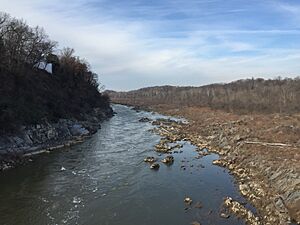Little Falls (Potomac River) facts for kids
Quick facts for kids Little Falls |
|
|---|---|

View of the river near Little Falls
from the Chain Bridge |
|
| Lua error in Module:Infobox_mapframe at line 185: attempt to index field 'wikibase' (a nil value). | |
| Location | Border of Arlington County and Fairfax County, Virginia, Montgomery County, Maryland and Washington, D.C. |
| Coordinates | 38°56′00″N 77°07′05″W / 38.93333°N 77.11806°W |
| Type | Cascade |
| Elevation | 13 feet (4.0 m) |
| Watercourse | Potomac River |
Little Falls is a special area on the Potomac River where the water flows quickly over rocks, creating what are called rapids. It's located where the river drops from older, harder rocks to softer ground. This spot is important because it's the first big obstacle for boats trying to travel upstream on the Potomac River.
You can see Little Falls from the Chain Bridge, which is about half a mile downstream. It's called 'Little Falls' to tell it apart from 'Great Falls', which is a much bigger waterfall about 5 miles further up the river.
Exploring Little Falls
Little Falls is found where Washington, D.C., Maryland, and Virginia all meet. This area is part of a natural boundary called the Atlantic Seaboard fall line. This line marks where the harder, older rocks of the Piedmont Plateau meet the softer, newer sediments of the Atlantic coastal plain. Because of this change in rock types, the river drops in elevation, creating the rapids.
History of the Falls
The first European to explore the Potomac River as far as Little Falls was Captain John Smith. He was an English explorer who visited the area in 1608. When he saw Little Falls, he wrote about how much wildlife there was. He mentioned that "deer, buffaloes, bears and turkeys" were everywhere, and the land was very fertile.
Later, in 1757, a local church was named "The Falls Church" because of its closeness to Little Falls. This church was near a main road used to move tobacco around the falls. The town that grew up around this church also took the name Falls Church, Virginia.
 | Audre Lorde |
 | John Berry Meachum |
 | Ferdinand Lee Barnett |

